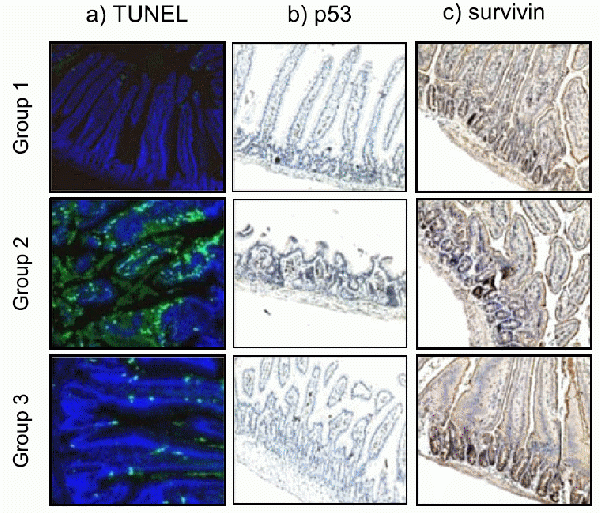2017년 03월 The efficacy of human placenta-derived mesenchymal stem cells on radiation enteropathy along with proteomic biomarkers predicting a favorable response
첨부파일
-
 201703.pdf
(2.4M)
4회 다운로드
DATE : 2018-03-01 01:02:49
201703.pdf
(2.4M)
4회 다운로드
DATE : 2018-03-01 01:02:49
관련링크
본문
Background
Radiation enteropathy is a common complication in patients with abdominopelvic cancer, but no treatment has yet been established. Stem cell therapy may be a viable therapeutic option because intestinal stem cells are highly vulnerable to ionizing radiation (IR) and stem cell loss explains its intractability to general treatment. Here, we investigated either prophylactic or therapeutic efficacy of human placenta-derived mesenchymal stem cells (hPDSCs) against radiation enteropathy and could identify biomarkers predicting a favorable response to stem cell therapy.
Methods
We challenged a radiation-induced enteropathy model with hPDSCs. After sacrifice, we checked the gross anatomy of small intestine, histology gross, and analyzed that, accompanied with molecular changes implicated in this model.
Results
hPDSCs significantly improved the outcome of mice induced with either radiation enteropathy or lethal radiation syndrome (P < 0.01). hPDSCs exerted inhibitory actions on inflammatory cytokines, the re-establishment of epithelium homeostasis was completed with increasing endogenous restorative processes as assessed with increased levels of proliferative markers in the hPDSCs group, and a significant inhibition of IR-induced apoptosis. The preservation of cells expressing lysozyme, and Musashi-1 were significantly increased in the hPDSC treatment group. Both preventive and therapeutic efficacies of hPDSCs were noted against IR-induced enteropathy. Label-free quantification was used to identify biomarkers which predict favorable responses after hPDSC treatment, and finally glutathione S-transferase-mu type, interleukin-10, and peroxiredoxin-2 were validated as proteomic biomarkers predicting a favorable response to hPDSCs in radiation enteropathy.
Conclusions
hPDSCs may be a useful prophylactic and therapeutic cell therapy for radiation enteropathy.
Radiation enteropathy is a common complication in patients with abdominopelvic cancer, but no treatment has yet been established. Stem cell therapy may be a viable therapeutic option because intestinal stem cells are highly vulnerable to ionizing radiation (IR) and stem cell loss explains its intractability to general treatment. Here, we investigated either prophylactic or therapeutic efficacy of human placenta-derived mesenchymal stem cells (hPDSCs) against radiation enteropathy and could identify biomarkers predicting a favorable response to stem cell therapy.
Methods
We challenged a radiation-induced enteropathy model with hPDSCs. After sacrifice, we checked the gross anatomy of small intestine, histology gross, and analyzed that, accompanied with molecular changes implicated in this model.
Results
hPDSCs significantly improved the outcome of mice induced with either radiation enteropathy or lethal radiation syndrome (P < 0.01). hPDSCs exerted inhibitory actions on inflammatory cytokines, the re-establishment of epithelium homeostasis was completed with increasing endogenous restorative processes as assessed with increased levels of proliferative markers in the hPDSCs group, and a significant inhibition of IR-induced apoptosis. The preservation of cells expressing lysozyme, and Musashi-1 were significantly increased in the hPDSC treatment group. Both preventive and therapeutic efficacies of hPDSCs were noted against IR-induced enteropathy. Label-free quantification was used to identify biomarkers which predict favorable responses after hPDSC treatment, and finally glutathione S-transferase-mu type, interleukin-10, and peroxiredoxin-2 were validated as proteomic biomarkers predicting a favorable response to hPDSCs in radiation enteropathy.
Conclusions
hPDSCs may be a useful prophylactic and therapeutic cell therapy for radiation enteropathy.









